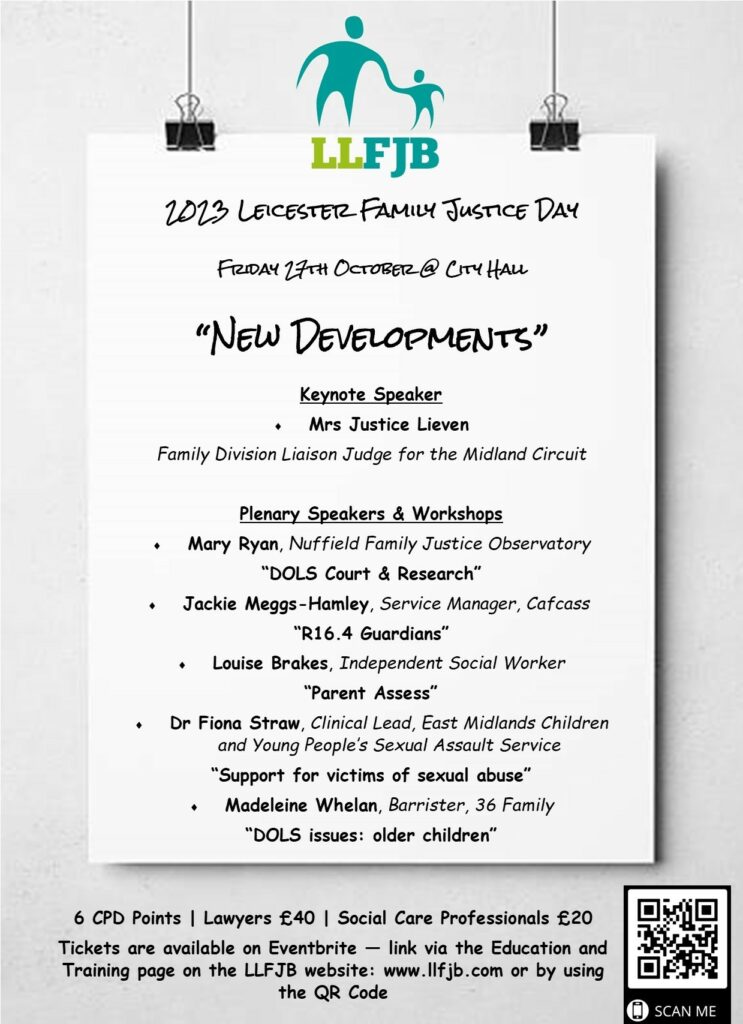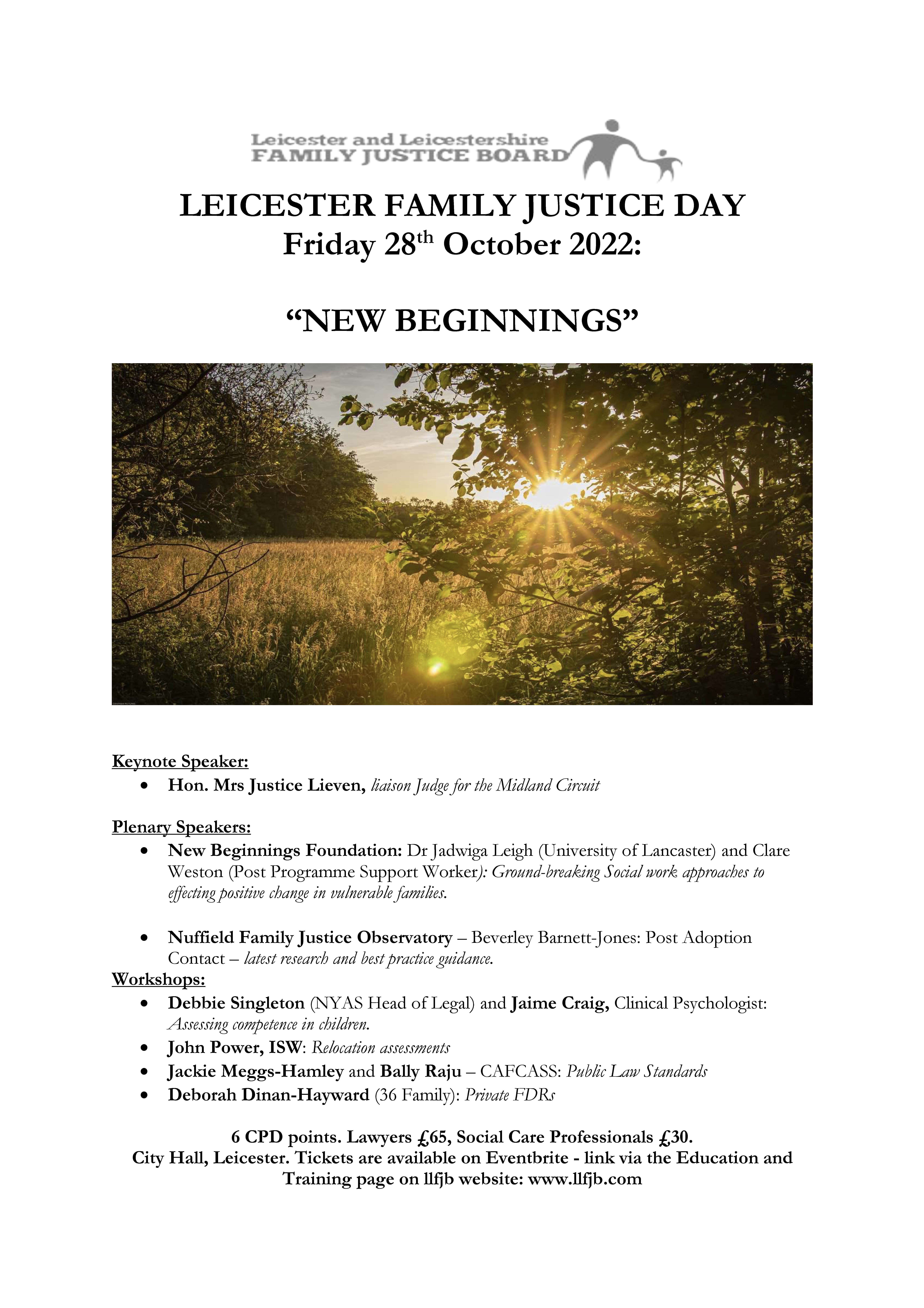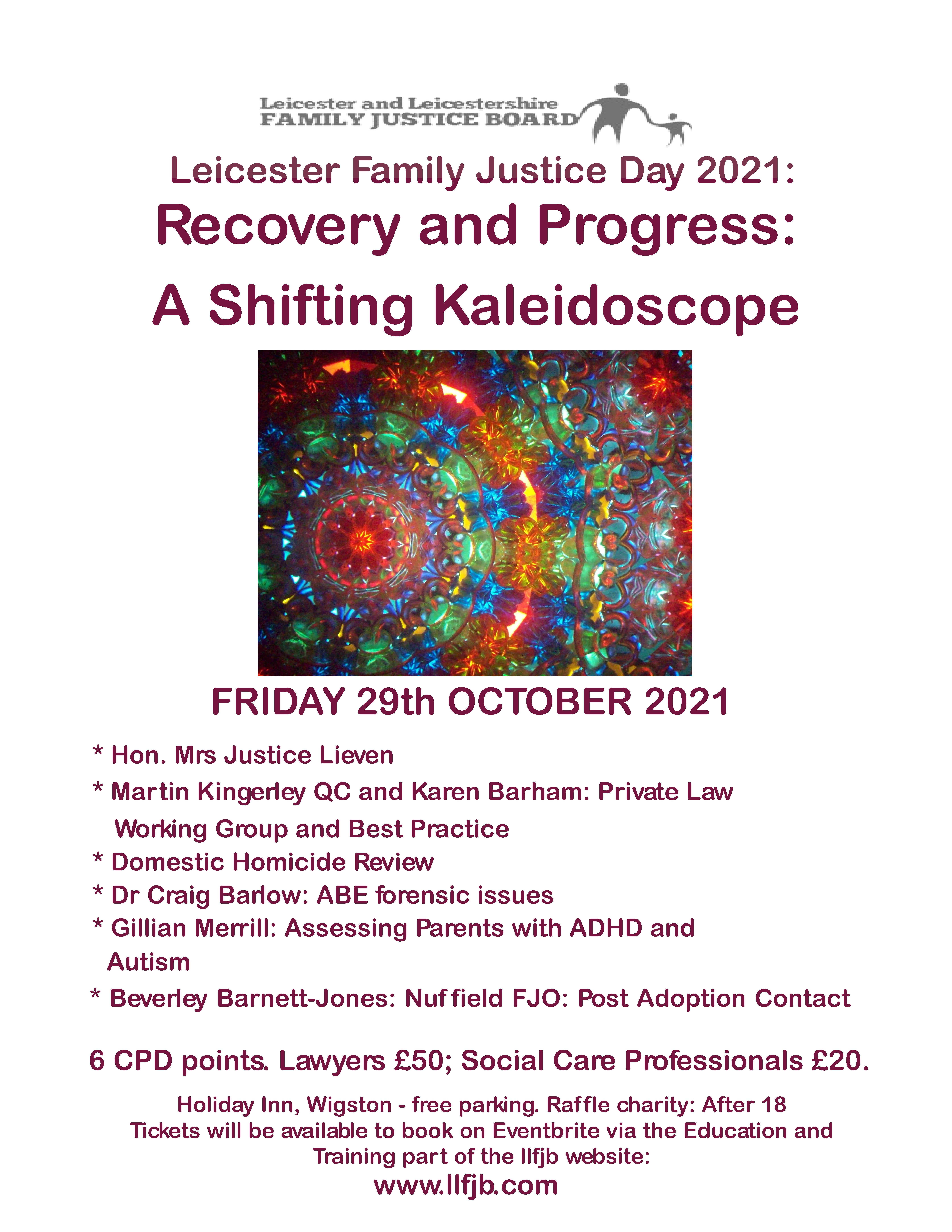We were delighted to welcome so many delegates to our annual Family Justice Day on 29th October 2021. Entitled Recovery and Progress: A Shifting Kaleidoscope, we continued our long tradition of hosting a number of excellent speakers who delivered insightful and engaging sessions.
Our Designated Family Judge Her Honour Judge George opened the day by welcoming the delegates, telling us how glad she was to finally be able to meet and share ideas face to face once again. She thanked the Education Sub-Committee for their hard work in organising the day.
Mrs Justice Nathalie Lieven, Family Division Liaison Judge for the Midlands Circuit, delivered the keynote address. She focussed on the efforts which need to be made across the board to recover the backlog of cases caused by the pandemic, to make the whole system more efficient and to stem the tide of private law disputes which ought not to come before the Family Court in the first place. As she said, “if we don’t get each bit of the system working, none of it works”.
Lieven J struck a positive note, reflecting that, as we emerge from the pandemic, there is an opportunity for new ideas to come to the fore. She said that crises always make people think about and question how they had been doing things, so now is the time to look at family justice and ask “Why are we doing that?”. She did recognise that what is required is a cultural shift, however there are many things we can do now to improve, such as:
- Better pre-proceedings preparation in public law cases
- Increased trust in local authority social workers
- Fewer expert instructions
- Compliance with orders and court timetables
- More efficient hearings
- Robust case management
- More focussed cross-examination
The High Court Judge highlighted the need for practitioners in all areas of the system to work together and to give honest feedback about what is or is not working. She explained that there is still no clear consensus as to the best way forwards post-pandemic and to which elements of remote working we should retain. However, we ought to be prepared to attend court if required and need to remain mindful of the needs of clients when listing hearings.
Lieven J moved to touch upon three other important areas of reform. The first is the need for local areas to begin to implement the recommendations of the Family Solutions Group and to arrange parenting hubs which can provide multi-agency support in order to divert private law disputes away from court. The second was the publication today of the President’s Transparency Review and her clear wish to support him in improving openness in the family justice system: in her view “closed justice is no justice at all”. Finally, the FDLJ explained the principal reforms which will be introduced by the Domestic Abuse Act 2021.
Following their recent Family Law article “The Family Solutions Initiative – a response to a system in crisis”, Martin Kingerley QC and Karen Barham gave an in-depth presentation on the recommendations of the Family Solutions Group “What about me?” report. Focussing on both the long and short term recommendations, they explained that there is a need for a public shift away from “blame culture” in order to encourage separated families to resolve any conflict outside the sphere of litigation. Public education is required, as is the implementation of a framework of support for children and young people affected by parental separation.
There are many steps which family law practitioners can take now to improve outcomes for their clients. The working group has recommended mandatory training for lawyers undertaking children work. We must begin to shift our language away from the language of conflict to the language of solutions. Judicial training and enforcement of Part 3 of the Family Procedure Rules is required immediately.
The speakers explained the many initiatives underway to improve and develop out-of-court dispute solutions which meet the many and varied needs of separated families, such as Parenting Co-ordinators, The Certainty Project, The Divorce Surgery and the options for moulding the mediation model to the needs of clients, including hybrid, blended, virtual and shuttle mediation.
Karen set out her proposals for the introduction of a Part 3 Protocol, designed to strengthen the judicial powers of encouragement towards out-of-court solutions.
The speakers also touched upon the need for the implementation of local separated families alliances, including online information hubs. We have today launched our Support for Separated Families page which we hope to grow over the coming months to incorporate all of the agencies and providers who will form part of our local alliance.
Following a welcome coffee break, we heard from Stephanie McBurney and Mark Fitzgerald from the Safer Leicester Partnership on “Learning from Leicester Domestic Homicide Reviews”. The speakers explained the process of local DHRs and how the Partnership uses the review process to make recommendations for change in order to reduce the risk of fatal familial and intimate partner violence in the future. We looked at some common themes which have emerged and considered how research such as the Eight Stage Homicide Timeline can assist practitioners to identify risk factors and safeguard potential victims accordingly.
We then broke out into workshop sessions.
Consultant Forensic Social Worker and Criminologist Dr Craig Barlow delivered a seminar on the best practice for the use of achieving best evidence interviews and how they can be deployed to assist the Family Court. His helpful workshop took delegates through the evolution of the ABE process and gave valuable advice about what we ought to expect from interviewers.
Consultant Forensic Psychologist Gillian Merrill hosted an engaging seminar which explained how practitioners could better understand and meet the needs of young people or clients with attention deficit hyperactivity disorder and autistic spectrum disorder.
Professor Mandy Burton delivered an important workshop highlighting the outcomes from the 2020 Harm Report “Assessing Risk of Harm to Children and Parents in Private Law Cases”, providing many learning points for practitioners in all areas of the family justice system.
Unfortunately, Beverley Barnett-Jones was unable to attend today due to unforeseen circumstances, but we hope that she will be able to deliver her workshop on post-adoption contact online soon.
As ever, we thank the Committee members Ben Mansfield, Fiona Gingell, Della Philips, Kate Reeves, Margaret Robinson, Keeley Lee and Luke Dickinson for their sterling efforts in organising such a valuable training day, as well as the Leicester County Court staff for their invaluable assistance. We also thank Dodds Solicitors for arranging the raffle in support of Leicester Children’s Holidays.
Slides from the various presentations and workshops will be available for download shortly.
We would appreciate it if delegates could leave us feedback in the forms provided and we look forward to seeing you all again next year.
Read More




